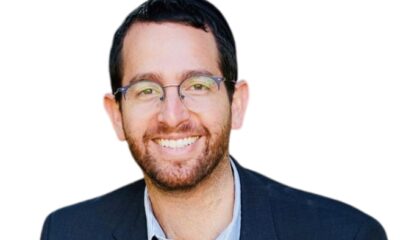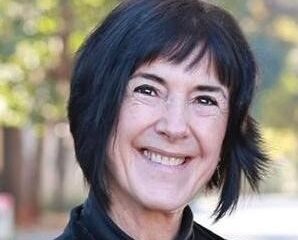
Banner

A 3D take on teaching and leadership
“The most transformative type of education is ‘teaching without teaching’,” said Professor Thuli Madonsela. “It’s what we learn from our teachers without them consciously setting out to teach us. Teaching is leadership – influencing and inspiring yourself and others to think and act in ways that achieve your purpose.”
Madonsela, the former public protector of South Africa, was keynote speaker at the Education 3D conference at Investec in Sandton on 7 May. Hundreds of teachers and others attended this inspirational event, including many from King David, organised to commemorate 75 years of King David Schools in South Africa, with the first campus having opened in 1948.
Our parents are our first teachers, Madonsela said. From hers, she learned about human solidarity. They let total strangers who missed their bus or their train sleep in their home, respecting their shared humanity. “We don’t have to live in a selfish world where it’s ‘eat or be eaten’ or ‘kill or be killed’,” she said.
She spoke about teachers who had had a profound influence on her. Mr Banjwa at her primary school taught her that all of us have greatness within, whether rich or poor. “Greatness comes when we excel in an area of passion and skill, to give purpose to our lives,” he told her. He also showed that one can be a leader at any age. “You don’t need anyone’s permission or a title.”
Later, John Daniels, a lecturer at the University of Swaziland (now eSwatini), taught her “to bloom wherever you are planted”, and to leverage adversity for good. He was instrumental in arranging United Nations scholarships for students in need to lift them out of poverty. Madonsela said she was grateful to the strangers who had paid for her education.
Madonsela offered some insights from the “teaching without teaching” she had learned in her life. “What we reward, grows,” she said, and “there is power in the images and the stories we tell. We can diminish humanity through images, but we can also elevate it. Great leaders discover and unleash their innate greatness.” She noted that teachers are among the most important role models that young people will emulate.
A panel moderated by journalist Mandy Wiener discussed the education revolution spurred by new technology. The COVID-19 pandemic rapidly accelerated the use of virtual learning platforms such as Teams and Zoom. “We live in a hybrid environment where there is more than a single path to learning,” said educationist Colin Northmore. “We need to move beyond the teacher being ‘the sage on the stage’. Technology offers us the opportunity to create choice, variety, and specialisation.”
Michele Botha from the Independent Examinations Board (IEB) said that assessments shouldn’t be thought of as doors to the next stage, but rather windows for learning experiences. The IEB’s Robyn Mowatt said that technology, like artificial intelligence (AI) and ChatGPT, would “be a disruptor in all aspects of life, and this shouldn’t surprise us”. She said teachers should be careful about sending a message that assumes students will cheat with AI, and instead should look at how to integrate these technologies into the classroom. “Teachers need to upskill and become lifelong learners,” she said.
Educational entrepreneur Taddy Blecher said, “Technology is just a tool; the human being is what really matters … Kids know more about these technologies than teachers, therefore we need to unleash their creativity, with teachers as their guides.” He spoke about how his work has put 22 000 young people through university education, people who were abandoned by society, and that 22 000 of them have good jobs. “Never settle for second best, and push all the time,” Blecher said.
The panellists all agreed that students need to become more adept at fact checking and assessing the reliability and bias of information gleaned online. Technology won’t slow down, so humans must catch up.
In a break-out session, Dean McCoubrey of MySociaLife gave advice to teachers and parents on how to understand the digital world that children and teens inhabit, and how to keep them safe from online predators. He also discussed how many students were finding specialised teaching offerings online on platforms like YouTube and TikTok.
A second panel featured psychologists Naomi Holdt and Paul Bushell, who addressed the social and emotional toll of COVID-19 and other contemporary stressors on pupils. Depression and anxiety in teens and preteens has grown tremendously over the past decade, they said, and mental health-issues have been fuelled by technology and social media. Said Bushell, “Technology can be a connector and a disconnector. COVID-19 increased our connections with our inner ring, our immediate family, but distanced us from the outer circle. We learned how valuable connections are in human experience.” Both lauded the resilience shown by teachers, pupils, and parents in the pandemic, but said not enough attention had been paid to their mental health.
The thought-provoking event was rounded off by the dynamic Darren August, the author of the book A Teacher Changed My Life. August revealed a worrying statistic: though about 5 000 teachers are trained annually in South Africa, about 10 000 teachers leave the profession every year.
August held the audience in rapture as he described the ways in which various teachers influenced him. His Grade 2 teacher awarded him 13 out of 10 for recitation, building his confidence in his gift for public speaking. Later, he was bullied for being a “goody-goody teacher’s pet”, but his teacher told him to ignore it and just be himself. He left the audience feeling inspired and positive about the difference that teachers make in our lives.










